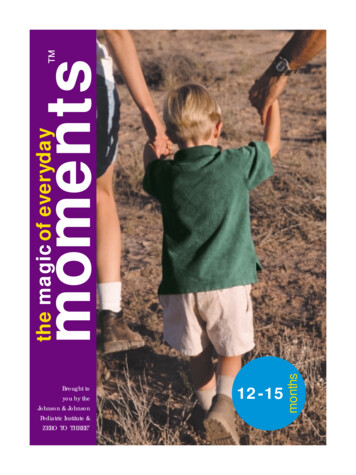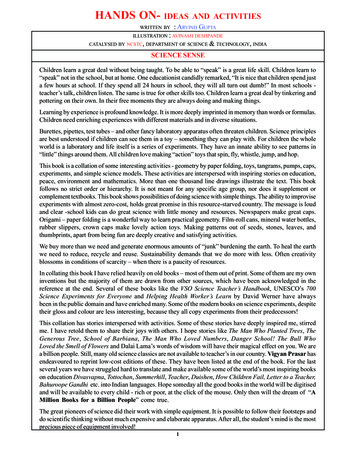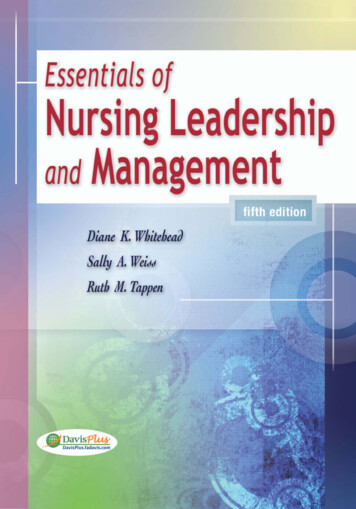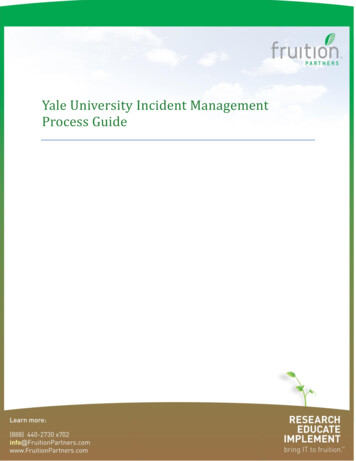
Transcription
Brought toyou by theJohnson & JohnsonPediatric Institute &ZERO TO THREE 12-15monthsthe magic of everydaymoments 26517 12-15.v4 11/29/00 2:20 PM Page 2
26517 12-15.v4 11/29/00 2:20 PM Page 3TMThe Magic of Everyday Moments : 12-15 MonthsAuthors: Claire Lerner, L.C.S.W., with Amy Dombro, M.S., and Karen LevineDesign: AXIS Communications, Washington, DC (www.axiscomm.com)Photo on page 6: Ross Whitaker, New York, NY (www.rosswhitaker.com)Published by:ZERO TO THREE2000 M Street N.W., Suite 200Washington, DC 20036-3307www.zerotothree.orgTo order more copies, contact:Johnson & Johnson Pediatric InstitutePhone: 1-877-JNJ-LINK (565-5465); Phone outside USA: 314-216-3560Fax: 1-877-JNJ-FAXX (565-3299); Fax outside USA: 314-216-3569Visit: www.JJPI.comCopyright 2000 ZERO TO THREEAll rights reserved.Printed in the United States of America.
26517 12-15.v4 11/29/00 2:20 PM Page 4Table of ContentsThe Magic of Everyday Moments . . . . . . . . . .1What It’s Like for You . . . . . . . . . . . . . . . . . . . . 3Taking a Walk.4Read With Me.6Reading Your Toddler’s Cues . . . . . . . . . . . . . . 9What to Expect . . . . . . . . . . . . . . . . . . . . 10 & 12What You Can Do . . . . . . . . . . . . . . . . . . 11 & 13What Your Child Needs Most . . . . . . . . . . . . . 15The Magic of Everyday Moments campaign is an initiative between ZERO TO THREE andthe Johnson & Johnson Pediatric Institute.ZERO TO THREE is a national nonprofit organization ofrenowned pediatricians, educators, researchers, and other childdevelopment experts who specialize in the first years of life.The Johnson & Johnson Pediatric Institute is an organization dedicatedto research and development conducted in support of improving pediatriccare around the world by partnering with leading healthcare professionalson topics in pediatrics, parenting and infant development.
26517 12-15.v4 11/29/00 2:20 PM Page 5TAcknowledgmentsZERO TO THREE and the Johnson & Johnson Pediatric Institute acknowledge the generouscontributions of ZERO TO THREE’s Parent Education Task Force in helping to shape, write,and edit this series of booklets. We especially appreciate the efforts of the following individuals:From our Board of Directors:Joy Osofsky, Ph.D.Kyle Pruett, M.D.Marilyn M. Segal, Ph.D.Bernice Weissbourd, M.A.Executive Director:Matthew E. Melmed, J.D.From our staff:Lynette CiervoNancy GuadagnoJoan Melner, M.S.Stefanie Powers, M.S.Tom SalyersNancy Seibel, M.S.Vicky Youcha, Ed.D.ZERO TO THREE also acknowledges our partner, the Johnson & Johnson PediatricInstitute, which, through its educational efforts, is shaping the future of children’s healtharound the world.
26517 12-15.v4 11/29/00 2:20 PM Page 6The Magic of Everyday MomentsLoving and Learning Through Daily ActivitiesIf you are like most parents today, your greatest challenge isprobably caring for your baby while also taking care of yourselfand your responsibilities. The competing demands on your timeand energy make finding the time to connect with your babyno small challenge. But daily activities, such as feeding, bathingand grocery shopping, don’t need to take time away from bondingwith and enjoying your baby. In fact, these everyday moments arerich opportunities to encourage your child’s development bybuilding her: self-confidence curiosity social skills self-control communication skillsMost of all you build her desire to learn about her world.The booklets in this series are not intended to be general guidesto everything that is happening at each specific age. Instead, theyfocus on how, through interactions with your baby during everyday moments, you can support your baby’s social, emotional andintellectual development.It’s the special interplay between parent and child thatmakes everyday moments so meaningful. The potential islimitless. The starting point is you. 1
26517 12-15.v4 11/29/00 2:20 PM Page 7
26517 12-15.v4 11/29/00 2:21 PM Page 8What It’s Like for YouAlthough there were times during your baby’s first year whenthe days (and nights) seemed endless—3 a.m. feedings, lateafternoon cranky sessions, that first tooth breaking through—right now things probably feel a little calmer in some ways, andmore demanding in others. This seems to be true for all stages ofdevelopment; while some things get easier, there are always newchallenges. Your child has made the transformation from thetiny stranger who came home with you from the hospital to aself-confident, opinionated person who takes up more space thanany two adults combined. As you set about celebrating her firstbirthday, you find yourself wondering how it all happened sofast. Don’t be surprised by a rush of emotions. You have probablyjust been through the most emotional and intense year of youradult life!One-year-olds have a remarkable sense of independence thatcomes hand-in-hand with their new ability to do things for themselves. But as much as they enjoy their independence, they alsotake great pleasure in running back into your arms. They love tobe cuddled and carried and babied . . . as long as they’rethe ones who decide when to be a “big girl” and when to be “ababy.” While this can drive parents crazy (“Is she a baby ora teenager?”) what your child needs to know is that whatever shechooses to be in any given moment, you’ll be there for her. Infact, if you respond to her need to be “babied,” she’ll eventuallychoose the “big girl” role over the baby. 3
26517 12-15.v4 11/29/00 2:21 PM Page 9takinga walkFor your toddler, taking a walk is a thrilling adventure,filled with endless opportunities for making new discoveries with the person he loves the most in the world!
26517 12-15.v4 11/29/00 2:21 PM Page 10If your toddler could talk:What a day! So much to see and smell, hear and do. The wind feels so coolon my face and I love the smell of freshly cut grass. I hear a dog barking.It sounds just like mine. Maybe if I wiggle around a lot and make someunhappy noises you’ll unstrap me and let me push the stroller. When youtalk with me about what we see and hear, I begin to learn new words like“car” and “bird.” I learn about making friends when we visit neighbors.When you ask me questions like “How do you think that bird got into thattree?” you teach me to be a good thinker. You keep me safe as I try newthings like climbing the steps of the library as you follow close behind. Ilove it when you slow down and let me be the leader. When we exploretogether, you open the world to me and I feel I can do anything!What your toddler is learning:Following your child’s lead and joining him as he explores the world tellshim his interests and ideas are important. You’re building his self-esteemand encouraging his curiosity and creativity. His language and intellectual development blossom when you describe new things and relate themto familiar things. (“That dog reminds me of Buddy.”) Each time youinvite your child to step out of his stroller and walk or climb, you areboosting his confidence in the use of his body. And when you share in thedelight of his discoveries—finding a shiny pebble or a colorful leaf—youare nurturing his desire to become a lifelong learner.What you can do: Share your child’s wonder when he makes new discoveries. The simplestobjects offer important lessons. Point out rocks that are big and small;houses that are red, yellow, blue; and trees that are short and tall.Children pick up these concepts best when they learn about themthrough their everyday experiences. Encourage him to use his body to explore—to push his stroller, benddown to examine objects, climb stairs. This gives him confidence that hecan use his body to get what or where he wants. 5
26517 12-15.v4 11/29/00 2:21 PM Page 11read with meWhen you read with your child, you are not only helping her develop good language skills, you are also building a strong, close relationship with her as youencourage her lifelong love of reading.
26517 12-15.v4 11/29/00 2:21 PM Page 12If your toddler could talk:One of my favorite times with you is when we read books together. It feelsso cozy and warm to snuggle up with you. I like it best when you show mea few books and then let me pick which one I want. You may wonder why Ipick the same book day after day. But it makes me feel so smart when Iknow what the book is about and can recognize the pictures. I love seeingpictures of kids doing things I do, or pictures of things I see in my world—like the cat who lives next door. Don’t worry if I keep turning back to thesame page, or if I just flip quickly through the book in seconds flat! Thereare so many ways to enjoy books. The point is, I’m having fun; and whenI’m having fun, I’m learning.What your toddler is learning:Children come to love reading, not just because they find books interesting, but because it is a joyful, shared experience with you. They make theconnection between reading and being close to you, and that connectionmakes them want to read more. The more they read, the more likely theyare to pick up language and communication skills, as well as an understanding of the world around them. There is no “right” way to read withyour baby. The only criteria is to make sure she is engaged and havingfun. She may want to read the same books over and over again; or shemay whiz through a book with lightning speed. Let her be incontrol of selecting what to read and turning the pages and she’ll have awonderful time.What you can do: Make time for reading everyday. Don’t feel you have to read every word in the book. Some of the bestbooks for young children are those with only pictures and no words.You can make up the story. And as your child grows and her imaginationdevelops, she can make up her own story. Go to your local library and let her explore. See what books she seems tolike. Take her to story time for kids her age. As her interest in beingwith other children grows, she’ll love this group activity. 7
26517 12-15.v4 11/29/00 2:21 PM Page 13
26517 12-15.v4 11/29/00 2:21 PM Page 14Reading Your Toddler’s CuesWhat follows is a chart that describes what children are learning at this stage and what you can do to support the development of these new skills. As you go through the chart, it’simportant to remember that every child is an individualperson, and grows and develops in her own way, at herown pace. Building a strong and close relationship with you isthe foundation of her learning and her healthy growth anddevelopment. Any concern about your child’s behavior or development deserves attention. Always discuss your concerns withyour child’s pediatrician or other trusted professional. 9
between 12 and 15 months:what to expect26517 12-15.v4 11/29/00 2:21 PM Page 15I’m Onthe MoveYour toddler will becomeincreasingly mobile—walkingand climbing up stairs onall fours. Remember, justbecause he can get up thosestairs doesn’t mean he can getdown! That’s when he’ll needsome help!Listen to MeYour toddler’s communicationskills will grow by leaps andbounds. She’ll use her gestures, as well as her voice, toshow you what she wants.She’ll point to the refrigeratordoor when she’s hungry,and drag you to her toy shelfto point to what she wants.I Can MakeIt Work!Your toddler will develop abetter understanding of howthings work. As he learnsabout the objects around him,like toothbrushes and telephones, he’ll want to use themall by himself.I Can Do It!Your toddler will want toparticipate more in dailyroutines. This kind of involvement will enhance her development on all fronts: motor,intellectual, social and emotional. Plus, she’ll delight inconnecting with you around“real work.”
26517 12-15.v4 11/29/00 2:21 PM Page 16Read, read and read some more.Label her feelings for her, “You’re mad I took the stick away!”Narrate what’s happening. “We’re rolling the ball. You have theball . . . now I have the ball.”When she says part of a word, repeat the “true” word for her.When she says, “juju,” you say, “You want juice.”Offer toys that represent objects in his world, such as play food,to help him practice being a “big person.”Give your child the opportunity to make things happen. Blowbubbles outdoors that he can chase, poke and pop. Provide simple musical instruments such as a tambourine or maraca.Include your child in everyday activities. She will feel proud andcompetent when she helps you do simple chores such as puttingthe napkins on the table.Let her help as you dress her. She can get her arms into sleevesand feet into shoes, and she’ll feel so proud of her accomplishments.Give her a spoon and let her try to feed herself soft foods likeyogurt or applesauce.what you can do:Create lots of safe places in your home where your child canexplore without any fear of danger. Left to his own devices, in asafe environment, your baby will do all kinds of exciting things:crawl under tables, cruise around a coffee table, stand on his own,practice balancing and even take his very first solo steps.
26517 12-15.v4 11/29/00 2:21 PM Page 17between 12 and 15 months:what to expectThat’s WhatFriendsAre ForYour toddler will be eagerto watch and play with peers.He learns so many importantskills through imitation,and he learns about how relationships work throughinteraction.Try andStop Me!Your baby’s increasing drive toexplore will require guidancefrom you about what she canand can’t do.RoutinesRule!There are certain things yourtoddler does every day . . . eat,sleep, wake up, get dressed.Establish routines aroundthese activities, because toddlers find comfort in structureand predictability; plus, it willhelp avoid power struggles inthe years ahead.ImagineThatWhen your toddler imitatesyour actions—by sweeping thefloor, stirring a play pot, etc.—she’s actually taking her firststeps into the world of imagination and ideas. Learning topretend lays the foundationfor advanced thinking skills.
26517 12-15.v4 11/29/00 2:21 PM Page 18Provide opportunities for him to play with other children.Research shows that toddlers are fascinated by and learn fromtheir peers.Distract and divert! While toddlers do understand “No! Don’ttouch that!” and may stop themselves when they hear you say it,they do not yet have the impulse control to stop themselves fromdoing it again. It’s very easy to fall into a trap of saying “No” allday long. So, rather than say “No,” try diverting your child’sattention with a substitute toy or activity, something to which youcan say, “Yes!”Establish a regular bedtime routine: bath, book, song andbed . . . or whatever works for you. The specifics aren’t nearly asimportant as the fact that your toddler will be able to predictwhat’s going to happen when, and not have to worry aboutsurprises.Mealtime is another good place for routine. “Before you leave thehigh chair, we have to wipe your hands!”Encourage make-believe by helping to set the stage and joiningher play. “Are you making dinner? Can I try some?”Provide lots of good props. A block can become a car; a chair canbecome a cave. Let her know how much you appreciate her imagination.what you can do:Don’t expect or pressure your toddler to share — he’s not readyyet. You can start to introduce the idea of “turn taking” by saying, “Now it is Sara’s turn . . . Now it’s Bob’s turn.” as you pass atoy back and forth. But if it doesn’t fly, don’t push it!
26517 12-15.v4 11/29/00 2:22 PM Page 19
26517 12-15.v4 11/29/00 2:22 PM Page 20What Your Child Needs MostWe know that you want to do your best to nurture your child’shealthy development. We also know that many parents are overwhelmed by busy days, and the thought of adding extra activities to boost their child’s development may simply be too much.That is the power of the magic of the everyday moment. Whatyour child needs most to thrive is you. Nothing else can replacethe power of what your child learns as he explores the world andshares his discoveries during everyday moments with you.We hope this booklet has shown you that the magic of parentingis not in any toy you buy or in the latest product claiming tomake your child smarter. The magic is in your everyday interactions that help your child build the crucial capabilities — such asconfidence, curiosity, cooperation, and communication — neededfor lifelong learning and success. 15
Remember, everyday momentsare rich bonding and learningopportunities. Enjoy the magic ofthese moments with your child.Don’t miss the other booklets inThe Magic of Everyday Moments series:the magic of everyday26517 12-15.v4 11/29/00 2:20 PM Page 1For more information on early childhood development, go to:www.JJPI.comAB00-B317www.zerotothree.orgJohPeZ
same page, or if I just flip quickly through the book in seconds flat! There are so many ways to enjoy books. The point is, I’m having fun; and when I’m having fun, I’m learning. What your toddler is learning: Children come to love reading, not just because they find books interest-ing











